What is a Digital Marketing Specialist?
A digital marketing specialist is a professional responsible for developing, implementing, and managing marketing campaigns that promote a company’s products or services online. They leverage various digital platforms and tools to connect with target audiences, increase brand awareness, and drive business growth. By staying updated on the latest trends in digital marketing, these specialists play a pivotal role in ensuring that businesses remain competitive in the digital landscape.
Introduction to Digital Marketing Specialists
Digital marketing specialists are at the forefront of online marketing. Their role encompasses a diverse set of responsibilities, including strategy development, campaign execution, and performance analysis. They bridge the gap between businesses and their online audience by using data-driven insights and creative strategies.
Key Functions Include:
- Analyzing market trends to identify opportunities.
- Utilizing platforms like Google Ads, Facebook, Instagram, and LinkedIn for advertising.
- Monitoring campaign performance using tools such as Google Analytics.
- Creating engaging content to capture audience attention.

Role in the Digital Marketing Landscape
In today’s digital-first world, marketing has shifted from traditional channels to online mediums. Digital marketing specialists are instrumental in this transformation, ensuring that businesses reach the right audience at the right time through the right platform.
Why They Are Essential:
- Customer Engagement: They help build meaningful connections with customers through personalized campaigns.
- Brand Visibility: By optimizing online presence via SEO, PPC, and social media, they enhance brand recognition.
- Data-Driven Decisions: They use analytics to track user behavior and adjust strategies for better results.
- Cost-Effective Marketing: Digital strategies often provide a higher ROI compared to traditional methods.

Why Businesses Rely on Digital Marketing Specialists
The role of a digital marketing specialist has become indispensable as more businesses recognize the power of online marketing. Whether it’s a startup aiming to establish its presence or a multinational corporation looking to sustain its market share, digital marketing specialists provide the expertise needed to navigate the digital world.
- Adaptability: They quickly adapt to emerging trends like influencer marketing, AI tools, and voice search optimization.
- Measurable Success: Their campaigns are measurable, allowing businesses to track ROI and adjust efforts accordingly.
- Audience Targeting: Using advanced targeting options, they reach specific demographics for maximum impact.

Types of Digital Marketing
Digital marketing consists of various strategies and techniques tailored to reach and engage audiences online. By leveraging multiple platforms and tools, businesses can amplify their online presence, boost engagement, and drive conversions. Below are four critical types of digital marketing strategies that every business should understand and utilize.
Social Media Marketing
Social media marketing (SMM) involves using social media platforms like Facebook, Instagram, LinkedIn, and Twitter to promote a brand, build an audience, and drive website traffic. SMM is a powerful way to connect with customers, share valuable content, and enhance brand loyalty.
Key Benefits:
- Audience Engagement: Foster direct communication with customers through comments, polls, and messages.
- Targeted Advertising: Platforms like Facebook and Instagram offer advanced ad targeting based on demographics, interests, and behaviors.
- Brand Awareness: Consistent posting and campaigns increase visibility across a global audience.
Effective Practices:
- Post consistently with visually appealing content.
- Use analytics to measure performance and refine strategies.
- Partner with influencers for greater reach.

Email Marketing
Email marketing involves sending personalized, targeted messages to a subscriber list to nurture leads, build relationships, and drive sales. It’s one of the most cost-effective and direct methods of communication in digital marketing.
Key Benefits:
- Personalization: Emails can be tailored to user preferences and behaviors, increasing engagement.
- Cost-Effective: Low cost with a high return on investment compared to other strategies.
- Automation: Platforms like Mailchimp or HubSpot allow automated workflows for welcome sequences, abandoned cart reminders, and more.
Effective Practices:
- Craft compelling subject lines to boost open rates.
- Segment your audience for more relevant content.
- Use A/B testing to optimize campaigns.
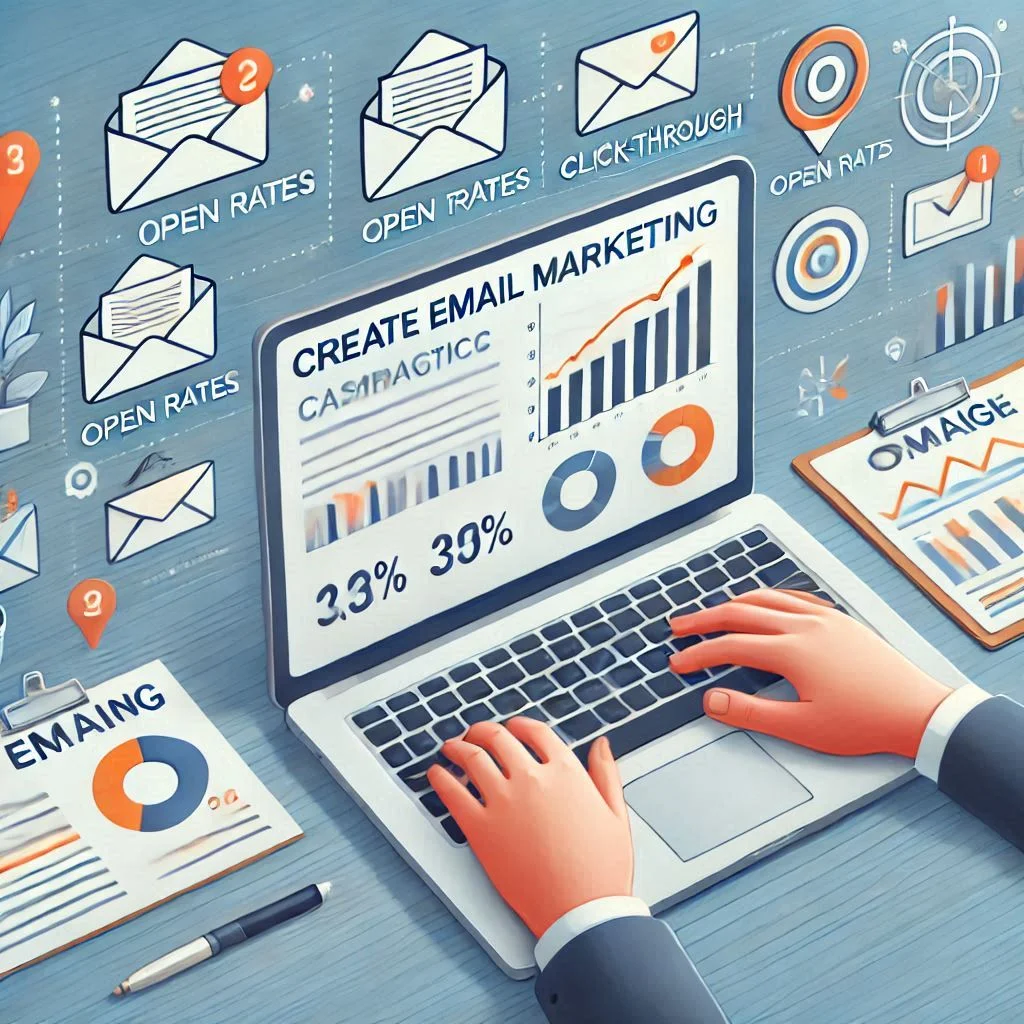
Search Engine Optimization (SEO)
Search Engine Optimization (SEO) enhances a website’s visibility on search engine results pages (SERPs). By optimizing content for specific keywords and improving site performance, businesses can attract organic traffic and increase their online authority.
Key Benefits:
- Increased Visibility: Rank higher on SERPs, leading to more clicks and traffic.
- Credibility and Trust: Users trust search engines and are more likely to click on top-ranked pages.
- Cost-Efficiency: Unlike PPC, organic traffic from SEO doesn’t require continuous ad spend.
Effective Practices:
- Conduct keyword research to target high-value terms.
- Optimize meta tags, headers, and content for keywords.
- Improve website speed and ensure mobile responsiveness.
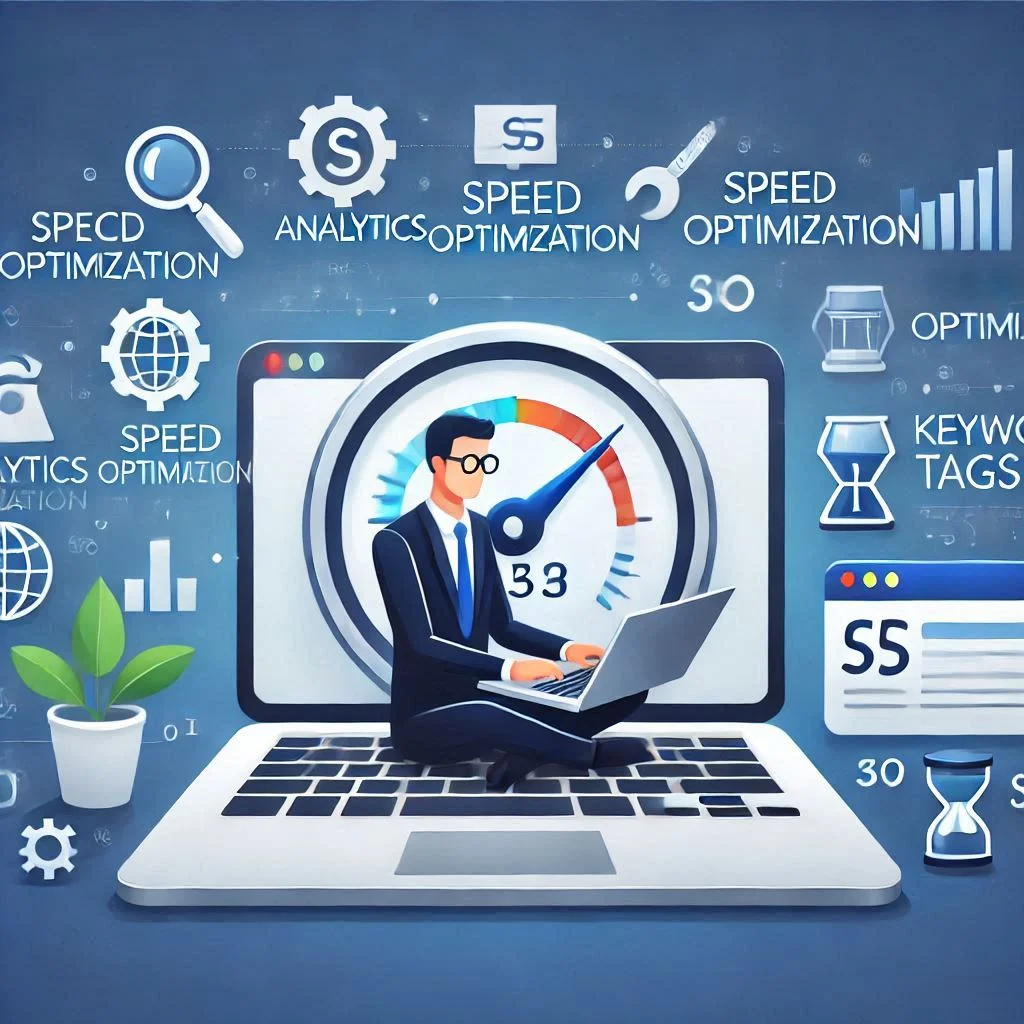
Content Marketing
Content marketing focuses on creating and distributing valuable, relevant content to attract and engage a specific audience. It involves blogs, videos, infographics, podcasts, and more.
Key Benefits:
- Audience Engagement: High-quality content keeps users on your site longer.
- Lead Generation: Informative and valuable content drives users to take action, such as subscribing or purchasing.
- SEO Synergy: Content optimized for keywords improves rankings and attracts organic traffic.
Effective Practices:
- Create evergreen content that remains relevant over time.
- Use storytelling to make content relatable and memorable.
- Incorporate visuals like infographics and videos for better engagement.
Key Responsibilities of a Digital Marketing Specialist
A digital marketing specialist holds a critical role in designing and executing strategies that help businesses grow in the online world. Their responsibilities are multi-faceted, ranging from creating campaigns to analyzing their performance and ensuring maximum ROI. Below are the detailed responsibilities that define the role of a digital marketing specialist.
Create and Execute Digital Marketing Campaigns
One of the primary responsibilities of a digital marketing specialist is to design and implement effective campaigns across multiple platforms. These campaigns are tailored to achieve specific goals, such as increasing brand awareness, driving traffic, or boosting sales.
Key Tasks:
- Research and identify target audience segments.
- Develop a comprehensive strategy that aligns with business goals.
- Launch campaigns on platforms like Google Ads, Facebook, and Instagram.
- Use A/B testing to refine strategies and improve outcomes.
Best Practices:
- Set clear, measurable objectives for each campaign.
- Regularly analyze campaign data to identify areas for improvement.

Ad Copywriting & Content Creation
Crafting compelling ad copies and engaging content is a cornerstone of digital marketing. Specialists must ensure their messaging resonates with the target audience while driving them to take action.
Key Tasks:
- Write persuasive ad copies for PPC campaigns and social media ads.
- Develop blog posts, infographics, and video scripts to support marketing efforts.
- Ensure content aligns with brand voice and audience needs.
Best Practices:
- Focus on user pain points and solutions in ad copy.
- Use engaging headlines and actionable CTAs (Call to Actions).

Develop Visual Assets for Campaigns
Visual elements are crucial for attracting and retaining audience attention. Digital marketing specialists often collaborate with graphic designers or use design tools to create impactful visuals.
Key Tasks:
- Create banners, graphics, and video thumbnails for campaigns.
- Optimize images and videos for social media and web usage.
- Ensure visuals are consistent with the brand’s identity.
Best Practices:
- Use tools like Canva or Adobe Creative Suite for design.
- Focus on high-quality, mobile-friendly visuals.

Administer Websites and Publish Content
Digital marketing specialists manage websites to ensure they are updated, optimized, and user-friendly. This involves publishing content, maintaining site performance, and enhancing user experience.
Key Tasks:
- Update blog posts, landing pages, and product information.
- Optimize site speed and mobile responsiveness.
- Ensure proper use of keywords for SEO purposes.
Best Practices:
- Regularly audit the website for broken links and outdated content.
- Use CMS platforms like WordPress or Shopify for seamless updates.
Monitor and Optimize Campaigns
Tracking the performance of campaigns and making data-driven adjustments is a critical responsibility. Specialists use analytics to ensure campaigns meet KPIs.
Key Tasks:
- Monitor metrics like CTR, CPC, and conversion rates.
- Adjust targeting and ad spend based on performance insights.
- Create detailed reports for stakeholders.
Best Practices:
- Use tools like Google Analytics and HubSpot for detailed tracking.
- Continuously test and refine campaigns to optimize ROI.
Communicate Results to Leadership
Reporting is essential to demonstrate the value of digital marketing efforts. Specialists must effectively communicate results to management and suggest improvements for future campaigns.
Key Tasks:
- Prepare clear and concise performance reports.
- Highlight successes and areas of improvement.
- Provide actionable recommendations for future strategies.
Best Practices:
- Use visual dashboards to make data easy to understand.
- Focus on ROI and key metrics that matter to leadership.
Essential Skills for Digital Marketing Specialists
To excel in the fast-paced and evolving world of digital marketing, professionals must possess a blend of workplace and technical skills. These skills enable them to create impactful strategies, communicate effectively, and stay ahead of industry trends. Below is a detailed overview of the essential skills for digital marketing specialists.
AI Tools Usage Skill, Like Zooli AI
A good digital marketing expert always try to use AI tools to grow easily.
Workplace Skills
Workplace skills are fundamental to navigating daily tasks, collaborating with teams, and adapting to new challenges. These skills are vital for maintaining a productive and innovative work environment.
1. Communication:
Clear and effective communication is crucial for coordinating with clients, team members, and stakeholders. A digital marketing specialist must articulate ideas, explain strategies, and present results with confidence.
Key Tasks:
- Drafting concise marketing briefs.
- Collaborating with designers, writers, and developers.
- Presenting campaign performance reports to leadership.
Best Practices:
- Use tools like Slack or Microsoft Teams for streamlined communication.
- Practice active listening to understand team and client requirements.
2. Teamwork:
Digital marketing is rarely a solo effort. Specialists work closely with content creators, developers, and sales teams to ensure campaigns run smoothly.
Key Tasks:
- Brainstorming ideas for campaigns in team settings.
- Delegating tasks and ensuring timely execution.
- Resolving conflicts and fostering a collaborative atmosphere.
Best Practices:
- Promote open discussions to encourage creativity.
- Celebrate team successes to boost morale.
3. Adaptability:
The digital marketing landscape is ever-changing, with new trends, tools, and algorithms emerging constantly. Adaptability allows specialists to stay relevant and deliver effective results.
Key Tasks:
- Learning and implementing new marketing tools.
- Adjusting strategies based on algorithm updates.
- Staying informed about industry trends.
Best Practices:
- Dedicate time weekly to learn about emerging technologies.
- Embrace feedback and use it to improve strategies.

Technical Skills
Technical skills form the backbone of a digital marketing specialist’s expertise. Mastery of these skills allows them to effectively execute campaigns, analyze performance, and achieve business goals.
1. Search Engine Optimization (SEO):
SEO is the cornerstone of digital marketing, ensuring content ranks higher on search engine results pages (SERPs). A specialist must know how to optimize websites, research keywords, and build backlinks.
Key Tasks:
- Conduct keyword research using tools like SEMrush or Ahrefs.
- Optimize on-page elements such as meta titles and descriptions.
- Track and improve rankings with Google Search Console.
Best Practices:
- Focus on user intent to create relevant content.
- Stay updated on Google’s algorithm changes.
2. Data Analytics:
Analyzing data is crucial for measuring campaign performance and identifying areas for improvement. Specialists use analytics tools to track user behavior, assess ROI, and make informed decisions.
Key Tasks:
- Monitor website traffic with Google Analytics.
- Create custom dashboards to visualize campaign metrics.
- Analyze conversion rates and optimize funnels.
Best Practices:
- Use predictive analytics to forecast trends and behaviors.
- Share insights with the team to improve overall strategy.
3. Digital Tools Expertise:
Proficiency in digital tools is essential for managing campaigns, automating tasks, and enhancing efficiency. Specialists should be comfortable with tools for social media management, email marketing, and design.
Key Tools:
- Social Media Management: Hootsuite, Buffer.
- Email Marketing: Mailchimp, HubSpot.
- Design: Canva, Adobe Creative Suite.
Best Practices:
- Invest time in mastering the most relevant tools for your niche.
- Regularly explore new features to optimize productivity.

Education and Experience Requirements
To succeed as a digital marketing specialist, a strong educational foundation and practical experience are crucial. These elements provide the knowledge and skills needed to create impactful marketing campaigns and adapt to the ever-evolving digital landscape. Below is a detailed exploration of the recommended education and experience requirements.
Recommended Educational Background
While formal education isn’t always mandatory in digital marketing, having a degree or certification in a relevant field can provide a competitive edge. This background ensures a thorough understanding of marketing principles, consumer behavior, and digital tools.
Ideal Degrees:
- Marketing or Advertising: Offers foundational knowledge of traditional and digital marketing strategies.
- Communications: Builds strong communication and content creation skills.
- Business Administration: Focuses on strategic thinking and market analysis.
- IT or Computer Science: Provides technical knowledge beneficial for SEO, analytics, and web development.
Certifications and Online Courses:
In the fast-paced digital marketing world, certifications demonstrate expertise in specific areas.
- Google Ads Certification (Google Skillshop)
- HubSpot Content Marketing Certification
- Facebook Blueprint Certification
- SEO Specialization (Coursera)
Best Practices for Education:
- Stay updated with industry trends by attending webinars and conferences.
- Leverage platforms like LinkedIn Learning or Udemy for ongoing skill development.
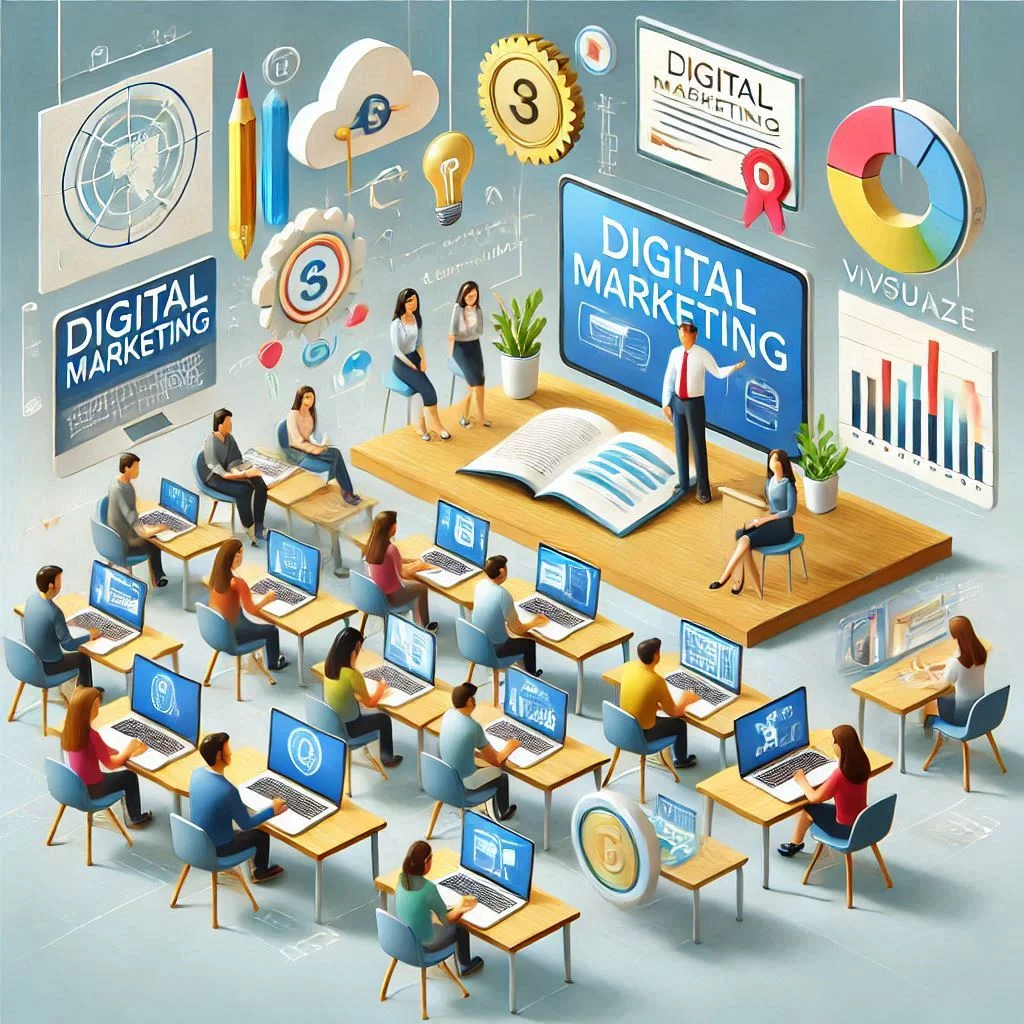
Gaining Practical Experience
Practical experience is essential to applying theoretical knowledge in real-world scenarios. Employers prioritize candidates with hands-on experience in managing campaigns, using tools, and analyzing data.
Internships:
Internships provide an excellent opportunity to gain real-world experience under the guidance of seasoned professionals.
- Assist with social media management and content creation.
- Learn how to optimize ad campaigns and measure their performance.
Freelancing:
Freelancing enables budding marketers to build a portfolio and gain practical skills.
- Offer services like SEO audits, blog writing, or social media management.
- Use platforms like Fiverr or Upwork to connect with clients.
Building a Portfolio:
A portfolio showcases your expertise and achievements, making you stand out to potential employers.
- Include case studies of campaigns you’ve managed.
- Highlight metrics like increased website traffic, improved SEO rankings, or boosted engagement.
Networking:
Connecting with professionals in the field can open doors to new opportunities.
- Attend industry events and join marketing groups on LinkedIn.
- Seek mentorship from experienced marketers.
Best Practices for Experience:
- Volunteer for non-profits to gain experience while contributing to a cause.
- Document your successes with measurable outcomes to add to your resume.
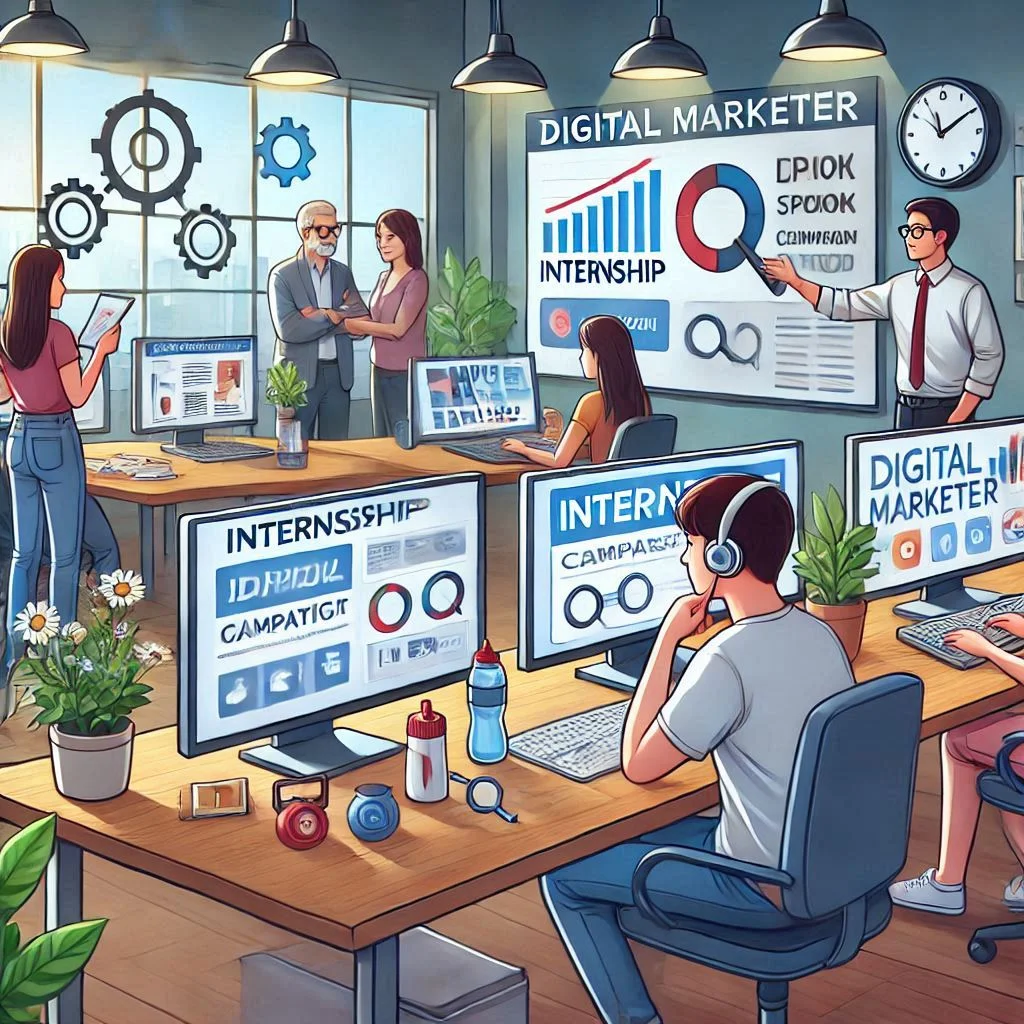
Combining Education and Experience
By combining a solid educational background with hands-on experience, aspiring digital marketing specialists can develop a robust skill set. This combination prepares them to tackle industry challenges and excel in competitive job markets.
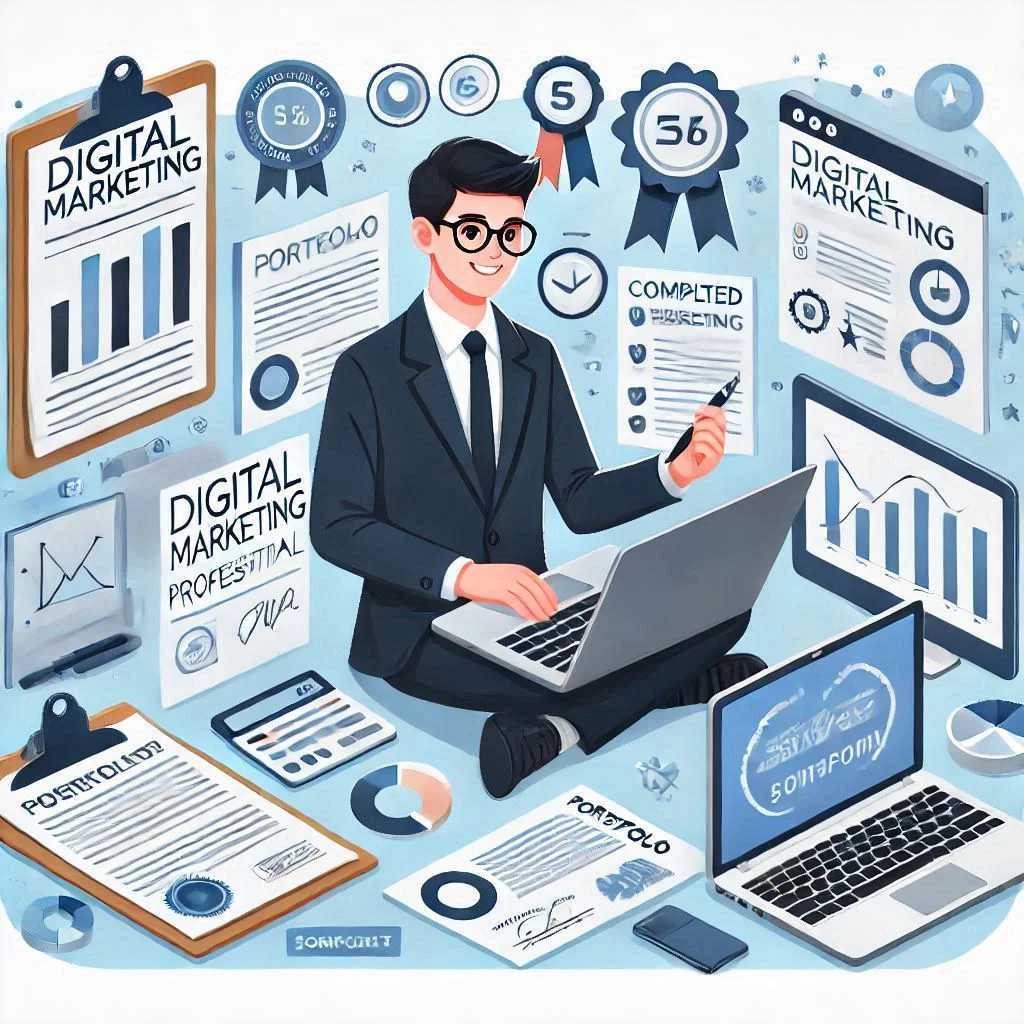
Career Path and Advancement Opportunities
A career in digital marketing offers diverse paths and opportunities for growth. Whether you’re just beginning or looking to advance, understanding how to break into the field and transition to higher roles is essential for long-term success. Below, we explore the steps to becoming a digital marketing specialist and advancing into specialized or managerial positions.
How to Become a Digital Marketing Specialist
Becoming a digital marketing specialist requires a combination of education, practical experience, and a commitment to continuous learning. Here’s a step-by-step guide:
Expanding Your Skill Set
Developing a broad skill set is vital to thriving in digital marketing. This involves mastering technical tools, learning analytical techniques, and understanding consumer behavior.
Steps to Expand Your Skills:
- Enroll in online courses on platforms like Coursera, Udemy, or LinkedIn Learning.
- Gain proficiency in essential tools like Google Analytics, SEMrush, and Canva.
- Keep up with trends by following industry blogs (e.g., Neil Patel, Moz).
- Practice real-world applications by starting your own blog or managing small-scale campaigns.
Specializations to Consider:
- SEO Optimization: Understanding how to improve search rankings.
- Social Media Marketing: Creating and analyzing campaigns on platforms like Facebook and Instagram.
- Content Marketing: Developing strategies to attract and retain audiences.
Best Practices:
- Set aside time weekly for skill development.
- Join webinars and attend conferences to stay updated.

Building a Strong Resume and Portfolio
Your resume and portfolio are your gateways to securing roles in digital marketing. Focus on showcasing your achievements, certifications, and projects.
Resume Tips:
- Highlight certifications such as Google Ads or HubSpot.
- List metrics-driven accomplishments (e.g., ‘Increased organic traffic by 35% in 6 months’).
- Customize your resume for each job application to emphasize relevant experience.
Portfolio Tips:
- Include case studies of campaigns you’ve run.
- Showcase a variety of projects, from SEO audits to ad copywriting.
- Use visuals like graphs and charts to demonstrate results.
Best Practices:
- Keep your portfolio updated with recent projects.
- Use platforms like Behance or personal websites to display your work.

Can I Advance into Other Roles?
Advancement opportunities in digital marketing are vast, allowing specialists to branch into more specialized or managerial positions. With experience and a strong track record, you can transition to high-paying, high-responsibility roles.
Transitioning to Managerial or Specialized Roles
As you gain experience, you can focus on specific areas or take on leadership positions.
Managerial Roles:
- Digital Marketing Manager: Oversee campaigns, budgets, and team performance.
- Content Strategist: Plan and execute long-term content marketing strategies.
- Marketing Director: Drive the company’s overall marketing vision.
Specialized Roles:
- SEO Specialist: Focus solely on improving search rankings and organic traffic.
- PPC Expert: Manage pay-per-click advertising campaigns.
- Data Analyst: Use advanced analytics to guide decision-making.
Skills for Advancement:
- Leadership and communication for managerial roles.
- Deep expertise in tools like Tableau, Google Ads, or HubSpot for specialized positions.
Best Practices:
- Take advanced certifications like the Google Marketing Platform Certification.
- Network with peers and attend industry events to learn about openings.
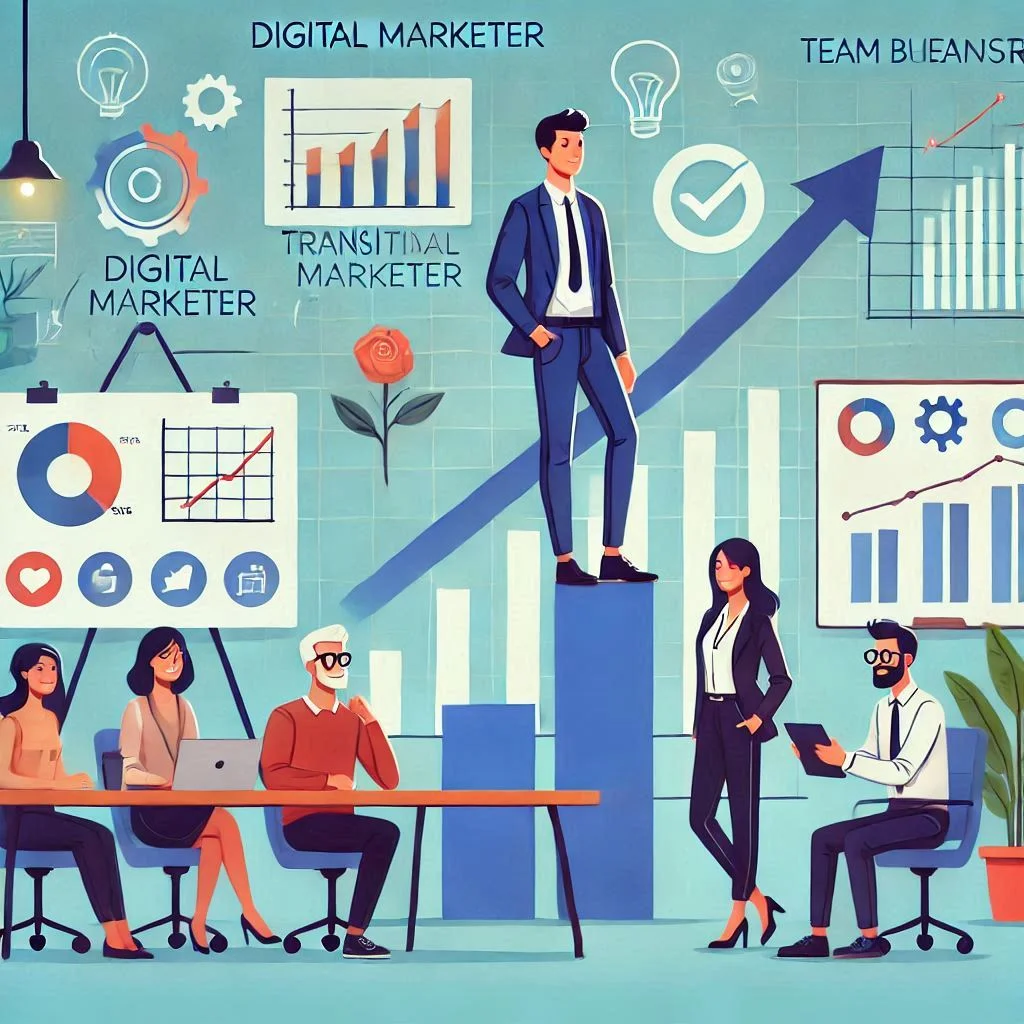
Frequently Asked Questions (FAQs) About Digital Marketing Specialists
What Does a Digital Marketing Specialist Do?
A digital marketing specialist creates, executes, and monitors online marketing campaigns to achieve a company’s goals. They use tools and platforms to optimize website traffic, improve SEO rankings, and engage audiences through social media, email marketing, and content creation.
What Qualifications Do I Need to Become a Digital Marketing Specialist?
While formal degrees in marketing, communications, or business are helpful, certifications like Google Ads, HubSpot, or Facebook Blueprint are equally valuable. Practical experience through internships or freelancing can enhance your qualifications significantly.
How Much Can a Digital Marketing Specialist Earn?
Salaries for digital marketing specialists vary based on experience, location, and industry. Entry-level positions may start around $40,000 annually, while experienced professionals and managers can earn upwards of $80,000 to $100,000 or more.
What Skills Are Most Important for a Digital Marketing Specialist?
Key skills include:
- Technical Skills: SEO, data analytics, and expertise in tools like Google Analytics.
- Workplace Skills: Communication, teamwork, and adaptability.
- Creative Skills: Content creation and ad copywriting.
Is Digital Marketing a Good Career Choice?
Yes, digital marketing is a promising career with high demand across industries. It offers opportunities for creativity, flexibility, and career growth. The digital nature of the field allows professionals to work remotely or as freelancers.
How Can I Gain Experience in Digital Marketing?
- Start with internships or volunteer work.
- Freelance to build a portfolio.
- Manage your own blog or social media accounts to demonstrate skills.
What Are the Common Challenges Faced by Digital Marketing Specialists?
Challenges include:
- Keeping up with rapidly changing algorithms and tools.
- Managing tight budgets and deadlines.
- Creating strategies that stand out in a competitive market.
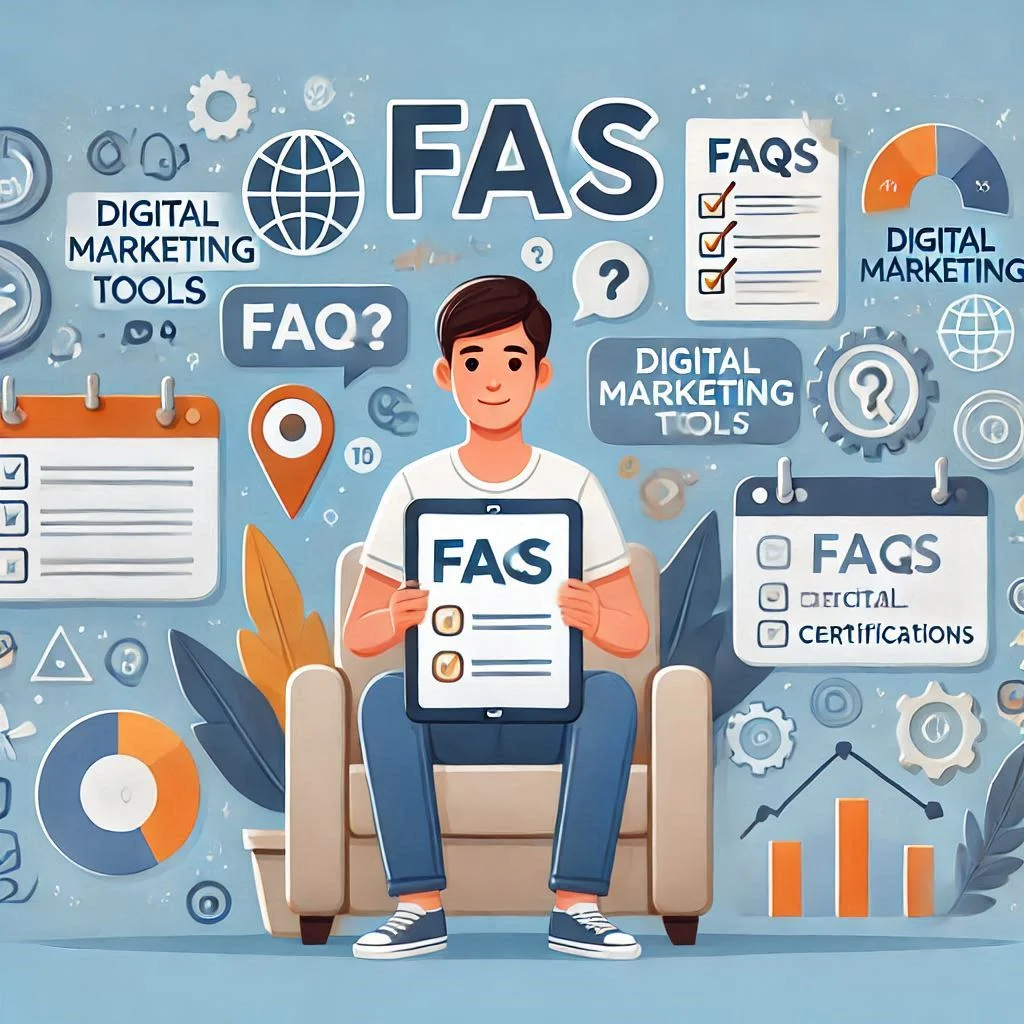
Conclusion
Digital marketing specialists play a pivotal role in the ever-evolving online landscape, driving business growth through innovative strategies and data-driven insights. With expertise in areas like social media marketing, SEO, and content creation, they bridge the gap between brands and their audiences in the digital world. For those aspiring to enter this dynamic field, building a solid foundation of education, technical skills, and practical experience is essential. Furthermore, career growth opportunities abound, with paths leading to managerial roles or specialized niches. By staying adaptable, continuously learning, and embracing new trends, digital marketing specialists can shape not only their careers but also the future of digital commerce. Whether you’re a beginner or an experienced professional, this field offers endless opportunities for growth, creativity, and impact.

